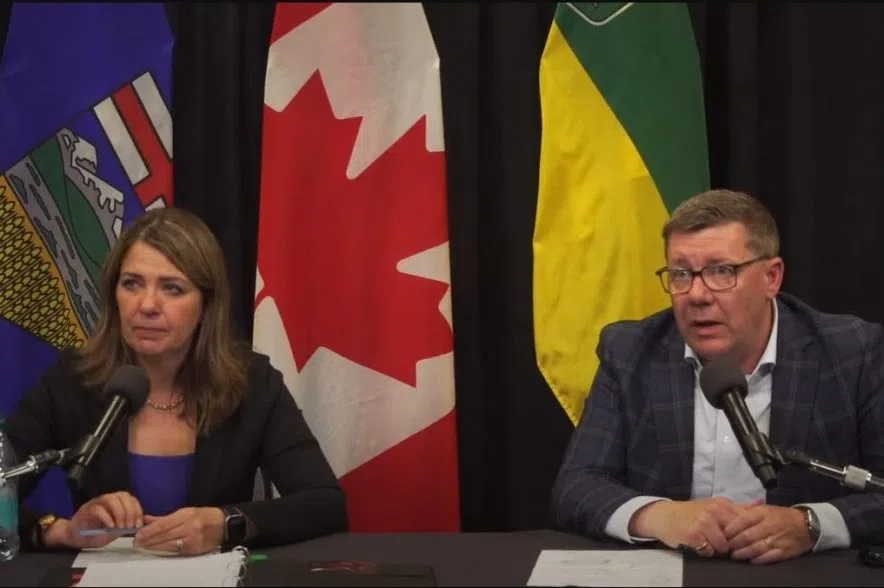The premiers of Alberta and Saskatchewan say Prime Minister Mark Carney needs to repeal certain energy policies if he wants Canada to have the strongest economy in the G7.
Saskatchewan Premier Scott Moe and Alberta’s Danielle Smith told a news conference Wednesday that includes policies such as the West Coast tanker ban and net-zero electricity regulations.
Those calls aren’t new for either premier, as both have been vocal about wanting Carney to act on their demands since before the April federal election campaign.
Read more:
- Four SPSA wildfire tankers out of commission for maintenance
- ‘This is different’: Southwest Sask. famers call for help after nearly a decade of drought
- ‘You killed my grandson’: Charges laid in Prince Albert murder case
Wednesday’s press conference came after Smith and Moe’s governing caucuses met in Lloydminster, a city that straddles the boundary separating the two Prairie provinces.
“We have a strong separate identity, but a great deal of commonality,” Smith said before reiterating her long-held demands of Carney, such as scrapping the emissions cap and taking off the “toxic” label given to plastic products.
“We’re here today as a united caucus because we’ve decided that enough is enough.”
Moe said Canada’s top priority should be building an energy corridor that connects the northwest coast to the coast of Hudson Bay, allowing Canadian energy to access European and Asian markets.
“This is really, I think, a generational strategic project that would provide the opportunity to create wealth, not just in western Canada but for all Canadians,” Moe said.
The port-to-port project is a pitch premiers have made for over a month, since it was a featured recommendation coming out of last month’s Western Premiers’ Conference.
Asked for thoughts on the Carney government’s major projects bill, Smith said it was necessary to “jump-start the investment in our country,” but that it wasn’t enough to really bolster investments in energy projects.
“I’m prepared to walk down that pathway on that particular approach,” Smith said.
“However, when I say it’s not sufficient, it would be an utter failure … if every project that had to be built in Canada had to built with federal tax dollars because no private proponent is willing to come forward and do it.”
The legislation would allow the federal government to designate certain projects as being in the “national interest” and advance them accordingly by granting approvals within two years.
Critics of the federal bill have said the bill would allow the government to sidestep consultation with Indigenous communities and ignore potential environmental repercussions.
Moe said passing the legislation, which is expected to happen before the end of the week, would be an admission that the regulatory system in place at the federal level is failing Canadians and needs to change — just as he and Smith have called for.
“Some of the bills and pieces of legislation that are in place, like the emissions cap, like the tanker ban, like the gag order on oil industries speaking about their sustainability situation … those can just be pitched overboard and repealed,” he said.
“We have months, not years, for that work to happen.”
This report by The Canadian Press was first published June 18, 2025.
— By Jack Farrell in Edmonton











